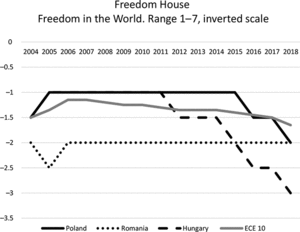
A few days ago, Pew Research released the results of public opinion surveys that show global perceptions of US leadership have plummeted, driven by President Trump’s poor handling of the pandemic. The report notes that “Trump Ratings Remain Low around the World, While Views of U.S. Stay Mostly Favorable”; Trump’s foreign policy is finding little support around the world.
Some of the results are striking, comparable to the low levels of global support for US leadership and foreign policy seen in March 2003, just prior to the military campaign in Iraq. Across the 32 countries surveyed by Pew, “a median of 64% say they do not have confidence in Trump to do the right thing in world affairs, while just 29% express confidence in the American leader.” The summary notes that “Anti-Trump” sentiments are especially common in Western Europe,” with three-quarters of respondents in France, Germany, Spain and Sweden lacking confidence in the U.S. President.
But while the numbers paint a grim picture about Trump’s standing among the median global voter, the same data show that Trump’s standing has actually increased with members of the “ideological right” across Europe and non-European states.
The survey shows a significant surge in support for Trump among European right-wing populist supporters. For example, the US President enjoys the confidence of 63% of UKIP supporters in the UK, 41 points more than non-UKIP supporters. In Sweden (+37), France (+30), Germany (+30), the Netherlands (+27) and Italy (+26), the differential is also strikingly high.

As we argue in Exit from Hegemony, Trump appeals to these segments not only because of his open disdain for mainstream politics and his skepticism of transatlantic institutions and the liberal international order, but his administration actively has sought to forge ties with right-wing illiberal leaders and movements throughout the West. The appointment of Ambassadors like Richard Grenell – whom German officials likened to a “propaganda machine”; David Kornstein to Hungary – who has been publicly supportive of the Viktor Orban’s self-styled illiberal democracy but will be stepping down to the lament of the government in Budapest government; and Peter Hoekstra to the Netherlands who has had to apologize for anti-Muslim remarks and who reportedly recently held a fundraiser for a Dutch far right-wing party (FvD); these appointees are a marked departure from previous Ambassadors – of either party – who expressed support for the European Union, NATO, and economic and political liberalism.
Indeed, Orban has endorsed President Trump’s re-election, and denouncement of the “moral imperialism” of Democrats; the White House hosted Polish President Andrejez Duda in the last days of a tight election in June. If Trump wins reelection, his administration is likely to continue to cooperate with illiberal right-wing leaders and parties. If Biden defeats Trump, the new administration will face a dilemma: to return to the status quo of non-interference or to find ways to more actively support liberal forces in Europe and elsewhere.
